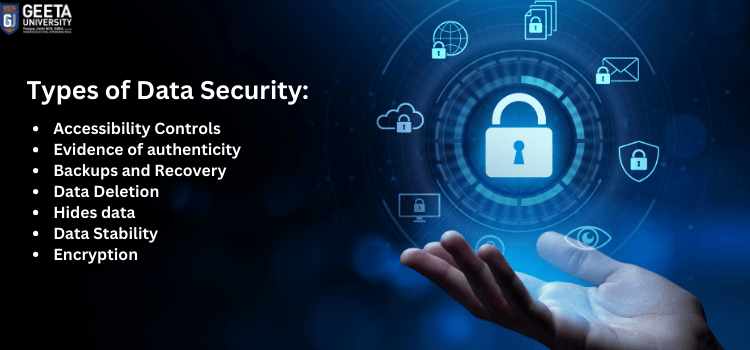What is data security? | Why is data security important? | Types of Data Protection

Definition
Data security refers to the practice of protecting digital information from unauthorized access, alteration, or disclosure, ensuring its confidentiality, integrity, and availability. It involves implementing measures such as encryption, access controls, and backups to safeguard sensitive data.
Importance of Data Security
For both public and private enterprises, data security is crucial for many reasons. The first is the companies have a moral and legal obligation to safeguard user and customer data to prevent breaches of incorrect hands. The possibility of data theft or hacking is another. If you don’t care about data security seriously, if there are any public law or hacking incidents, your reputation might suffer significantly.
Types of Data Protection

Accessibility Controls
The physical and digital access to sensitive systems is restricted as part of these data security procedures and facts. As part of this, make sure that all computers and gadgets have necessary login and that only authorized people may install physical places.
Evidence of authenticity
Similar to access restrictions, authentication focuses on precisely identifying people prior to data access. Passwords, PINs, security tokens, swipe cards, and biometrics are typical examples of this.
Backups and Recovery
In order to protect access to data in the event of a system malfunction, catastrophe, data corruption, or breach, you must have a plan. To retrieve the data if necessary, you will need a backup copy that is kept separately and kept on a virtual drive, a local network, or the cloud.
Data Deletion
By deleting the data, you can be confident that it won’t be accessible to anyone and won’t end up in the wrong hands.
Hides data
Data is encrypted using individual digits and alphabetic letters using encryption software characters. This efficiently conceals crucial information, even if it is discovered by an unauthorized organization. The Information only takes on its original form after being received by the authorized user.
Data Stability
Comprehensive data security entails ensuring that your systems can withstand or recover from failures, including incidents like power outages or natural disasters, without compromising security.
Encryption
Through encryption algorithms, text characters are transformed into unreadable formats, requiring matching encryption keys for authorized users to access the information. Encryption should be applied to various data, including files and email contact details.
Major Data Protection Concerns
Organizations must adhere to three fundamental elements of data security:
Confidentiality: Ensuring that data is only accessible to individuals with the appropriate credentials.
Integrity: Maintaining the reliability and accuracy of information while preventing unauthorized changes.
Availability: Ensuring that data remains easily accessible for ongoing business needs while maintaining security.
Data Security Technology
Utilizing suitable data security technology can help organizations prevent breaches, mitigate risks, and maintain security measures.
Data Testing
]Security breaches can be inevitable, and data analysis software plays a vital role in capturing and reporting issues such as alterations in data management, access records, and file formats. These audit procedures are essential for investigations, providing IT administrators with visibility to defend against unauthorized changes and potential violations.
Real-Time Data Warnings
Through real-time systems and data monitoring technology, organizations can swiftly detect violations, thereby reducing the risks of data loss, alterations, and unauthorized access to personal data.
Data Risk Assessment
Conducting comprehensive risk assessments yields reliable insights for prioritizing and addressing major security risks. These assessments summarize key findings, identify risks, and propose corrective actions.
If you like it, then keep reading the top university in Delhi, NCR viz. Geeta University’s blogs!!!
- By Ritika Manocha
Related Posts

Unraveling Mysteries: The Evolution and Impact of Fingerprint Science Worldwide
Introduction Fingerprint science stands as a cornerstone in forensic investigation, weaving intricate tales of identity, criminality, and justice. This age-old practice has evolved from a
Building Brand Loyalty in a Digital Age
Introduction: In today’s digital landscape, building brand loyalty has become both more challenging and more crucial than ever before. With consumers having access to a

Career prospects after higher studies in Science – Geeta University
Career prospects after higher studies in Science – Geeta University Selecting a career is one of the most fundamental & precious decision for an individual.It


